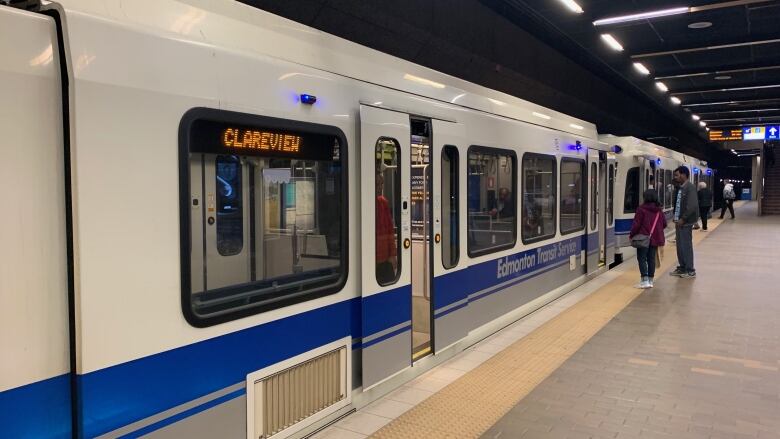Fine for fare evasion on Edmonton transit could go down in 2022
Report shows people with no fixed address got 42 per cent of tickets in 2019

The fine for neglecting to pay for abus or LRTride in Edmonton may go down to $150 from the current $250.
Councillors at a community and public services committee meeting Wednesday directed city staff to make bylaw changes by early next year.
The move comes as councillors reviewed a report showing42 per cent of fare evasion tickets in 2019 went to people with no fixed address.
Coun. Aaron Paquette said he struggles to understand why the city is ticketing$250 when nearly half of the people fined can't afford to pay them.
"That $250 might as well be $2 million, and since they have no way of paying, they just accrue more and more fines on their record," he said.
Paquette raised the issue more than a year ago after a report from Student Legal Services showed people with no fixed address homeless people, riders unwilling to show proof of address and those with no documents were disproportionately being ticketed.
Last February, council asked city administration to return with a breakdown of various bylaw fines and what's levied in other jurisdictions.
The report shows in 2019, peace officers gave out some 5,291 tickets related to proof of payment issues, including fare evasion, with 2214 going to people with no fixed address.
Fines in Ottawa, Calgary and Montreal start at $150.
Other infractions in Edmonton such as parking on a sidewalk, in a crosswalk, within fivemetres of a stop sign and not paying at metered parkingare $50 fines.
Parking in front of a fire hydrant, for example, is only $75.
Coun. Andrew Knack questioned said fines for parking in front of a fire hydrant or in an emergency zone compared to transit fare evasion seemed disproportionate.
"It looks like a very odd discrepancy," Knack said. "Things that actually affect the health and well-being of our society are actually lower in fine than somebody who doesn't pay the fare."
Paquette'smotion also calls for city staff to explore repayment options; and review current pass programs to see if barriers exist that prevent some people from accessing assistance.
Mayor Don Iveson said he was satisfied with the balanced approach, noting that the city has introduced several alternative programs for lower income earners, and recently started offering free transit for kids 12 years and under when accompanied by an adult.
Iveson supports some kind of fine for fare evasion.
"We still need to have consequences for people who can afford it who would roll the dice," he said.
David Aitken, manager of the city's community standards and neighbourhoods branch, noted that in 2020, 43 per cent of all interactions between peace officers and the public involved people with no fixed address.
In the past two years, peace officers and the city have changed their approach to education and assisting people instead of ticketing, he said.
Several years ago, the city amalgamated 18 different bylaws into the community standards and public places bylaws. They came up with $250 for several different kinds of infractions.
Paquette questioned the amount and whether it's worked.
"Did it reduce fare evasion, did it increase the purchasing of bus passes, did it do all the things that we hoped it would do?" Paquette asked during the meeting.
Carrie Hotton-MacDonald, acting manager of Edmonton Transit Services, said they have not evaluated the effectiveness of that fare amount but are willing to study it further.
Administration is expected toreport back to council with bylaw amendments and a breakdown of program alternativesby the first part of 2022.












_(720p).jpg)


 OFFICIAL HD MUSIC VIDEO.jpg)
.jpg)



























































































